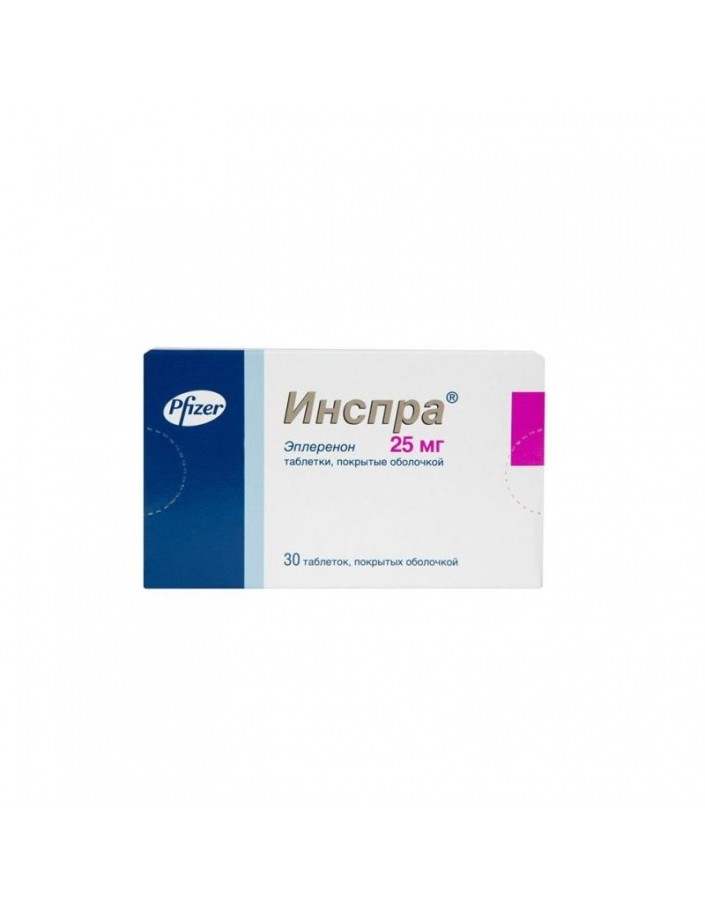



INSPRA PILLS 25MG - 30 tabs

Security policy (edit with Customer reassurance module)

Delivery policy (edit with Customer reassurance module)

Return policy (edit with Customer reassurance module)
30 pieces
eplerenone is relatively selective for the binding of recombinant human mineralocorticoid receptors compared to the binding of recombinant glucocorticoid, Progesterone and androgen receptors. Eplerenone prevents the binding of the aldosterone, the key hormone of the renin-angiotensin-aldosterone system (RAAS), which is involved in the regulation of blood pressure and the development of cardiovascular diseases.
Eplerenone leads to a prolonged increase in plasma renin and aldosterone, which is associated with the regulation of renin secretion by aldosterone on the principle of negative feedback. However, an increase in plasma renin activity and circulating aldosterone levels does not affect the effect of eplerenone on blood pressure.
Heart failure after myocardial infarction. The drug is used as a component of standard therapy in order to reduce the risk of cardiovascular morbidity and mortality in patients with a stable clinical condition with left ventricular dysfunction (left ventricular ejection fraction ≤40%) and clinical manifestations of heart failure after myocardial infarction.
AH Treatment of hypertension.The drug can be prescribed as a monotherapy, and in combination with other antihypertensive drugs.
Hypersensitivity to eplerenone or to any other component of the drug, hyperkalemia, moderately severe and severe renal failure, severe liver failure, pregnancy and breastfeeding, children's age.
Inspra can be prescribed as monotherapy or in combination with other antihypertensive drugs. The recommended initial dose of the drug - 50 mg 1 time per day. If the decrease in blood pressure is insufficient, the dose can be increased to 100 mg once a day.
In the EPHESUS study, the overall incidence of adverse events with the use of the drug INSPRA (78.9%) was similar to that with placebo (79.5%). Due to adverse events, drug treatment and placebo were discontinued in 4.4 and 4.3% of patients, respectively. The following are the adverse events reported in the EPHESUS study that may have been associated with treatment, as well as serious adverse events whose frequency was significantly higher than that in the placebo group. The undesirable phenomena are distributed on systems of an organism and frequency: frequent> 1/100, <1/10; infrequent> 1/1000, <1/100.
From the hematopoietic system and lymphatic system: infrequently - eosinophilia.
Metabolism and nutrition disorders: often - hyperkalemia; infrequently - dehydration, hypercholesterolemia, hypertriglyceridemia, hyponatremia.
Psychological: infrequently - insomnia.
Neurological disorders: often - dizziness; infrequently - headache.
From the side of the heart: infrequently - atrial fibrillation, myocardial infarction, left ventricular failure.
Vascular disorders: often - decrease in blood pressure; infrequently - orthostatic hypotension, thrombosis of the arteries of the lower extremities.
On the part of the respiratory system, chest and mediastinum: infrequently - pharyngitis.
From the digestive tract: often - diarrhea, nausea; infrequently - flatulence, vomiting.
From the skin and subcutaneous fat: Infrequently - excessive sweating, itching.
From the musculoskeletal and connective tissue: infrequently - back pain, cramps in the calf muscles of the legs.
From the kidneys and urinary tract: often - impaired renal function.
General and local: infrequently - asthenia, malaise.
Laboratory values: infrequently - an increase in the level of residual nitrogen of urea, creatinine.
Infections: infrequently - pyelonephritis.
In the EPHESUS study, there was an increase in the incidence of stroke in elderly patients (over 75 years). However, the incidence of stroke was not significantly different between the eplerenone (30) and placebo (22) groups.
In a dry, dark place at a temperature of 10 - 25 ° C.